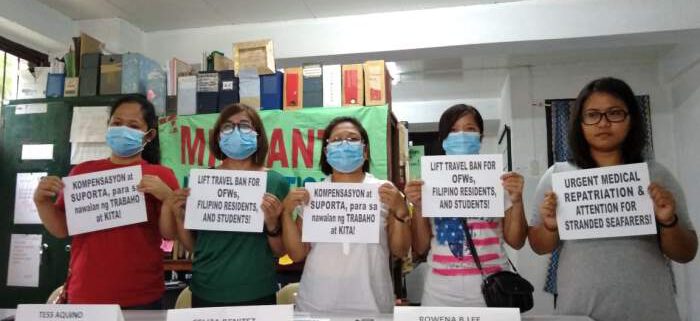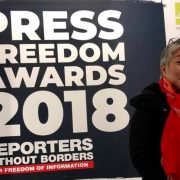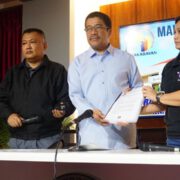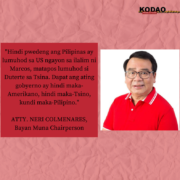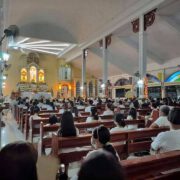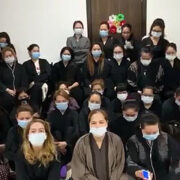Stranded OFWs urge lifting of HK travel ban; quarantined Pinoy seafarer’s daughter seeks medical repatriation for dad
Hong Kong domestic worker Eleveneth Baldero said she fears losing her job due to the travel ban imposed by the Manila government to the Chinese territory. Contractual workers like her may be fired if unable to return back to their employers on time as Philippine authorities have prevented Filipino citizens from travelling to Hong Kong and the rest of China.
“My contract is set to expire on 6 March that is why I’m really worried. Financially, I am running out of money to sustain my stay here in the Philippines. This is why I really need to return back to Hong Kong,” Eleveneth said in a press conference held at the Migrante International office in Quezon City last Monday, 17 February.
Eleveneth and other migrant workers demanded that the Rodrigo Duterte government lift the corona virus disease-19 (COVID-19) travel ban it imposed last February 2 and grant exemption to returning migrant workers, students and residents.
Rowena Lee was unable to hold back her tears thinking about her recuperating mother in Hong Kong recently discharged from a hospital from another ailment. “This is a very big problem for us since my 75-year old mother in Hong Kong still needs medical attention and I really want to return so I can be with her. She is all by herself,” Rowena said.
Rowena took a short leave from work 28 February and is being prevented to return to Hong Kong by the travel ban. Aside from worrying for her mother and her job, she is also anxious about bills and house rents that she needs to pay. “Our family needs us. It will be very hard for us if we get forced by the situation to borrow money just to extend our stay here. I am pleading to the government to lift the travel ban so we can return to our normal lives. We are struggling because we are not earning anything here,” she said.
Tess Aquino is a permanent Hong Kong resident and had been for 23 years. Aquino went home to the Philippines last 15 January for her annual leave and was set to fly back on 9 February. She heard about the travel ban on last 2 February and received an email notice from Philippine Airlines informing her about her flight’s cancellation. “I have attempted all possible ways to return back to Hong Kong. I was told by my company to try travelling to Hong Kong via Vietnam. Travel agencies refused to book my flight because of the travel ban and I was told that I will only be wasting my money because even if I make it to Vietnam, they would still not allow us to get to our final destination which is Hong Kong. For now, my company allowed me to temporarily work as home-based but for how long? I don’t think our employers will wait for us forever if this continues,” she narrated
Former Filipino Migrant Workers’ Union (FMWU-Hong Kong) chairperson Feliza Guy Benitez explained that overseas Filipino workers (OFWs) in Hong Kong are usually given two-week annual leaves, an opportunity they take to visit the Philippines. The leaves are often non-extendible. “If OFWs get terminated because they exceeded the 14-day leave, it will be hard for us to get back again to zero just to process all the application papers and the government won’t even pay for it,” Benitez said.
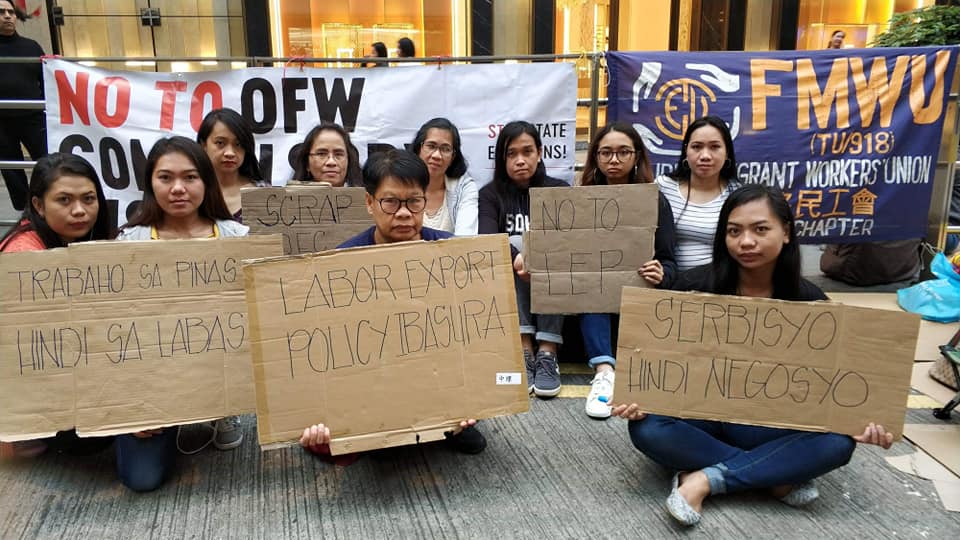
Urgent appeal
Benitez said 131 Hong Kong-based Filipino organizations already issued their Urgent Appeal Joint Statement calling on the Duterte government to lift the ban. The statement estimated that there are around 25,000 overseas Filipino workers who have been unable to leave the country because of the ban. “We all feel that the travel ban which was imposed without a warning or consultation is unjustified and oppressive. It was decided upon without a comprehensive understanding of how it would affect us, and was not even in line with health protocols set by the World Health Organization. The abruptness by which it was carried out also belied the concern for Filipinos abroad that President Rodrigo Duterte has expressed in numerous speeches and interviews,” the statement reads.
The statement added that an additional 1,000 OFWs are affected by the travel ban consisting of Filipino residents, students and small business proprietors in Hong Kong. “Health-wise, we also feel safer in Hong Kong where we are assured of excellent public health care at little or no cost to us. Some of us who have private medical insurance get the added bonus of being treated at private hospitals, also for free,” the statement said.
Feliza Guy Benitez, another Hong Kong OFW, decried the state of public health services in the Philippines. “People who need medical attention are safer in Hong Kong because of their advanced healthcare system. It will be harder for OFWs to settle back here in the Philippines because of high unemployment, low wages and contractualization,” Feliza Guy said.
The group also complained about the “miniscule amount of compensation offered by the Overseas Workers Welfare Administration (OWWA) to qualified OFWs. “Each stranded OFW was offered Php10,000 compensation from the OWWA Fund, an amount that would not even pay for the expenses they had to bear after being stranded at the airport. Moreover, non-OFWs were given no help at all, when many of them don’t even have houses in the Philippines, and have to pay for food and lodging while waiting for the ban to be lifted. They are also in danger of suffering even more if they lose their jobs, as they pay high rents and other expenses such as school fees for their children in Hong Kong,” the appeal said.
“When I went to OWWA, I was told that I am not covered because they are only processing compensation up to 16 February. I really do not know whether I will still receive any compensation from the government,” Eleveneth said.
Surrendering right to government assistance
The OFWs also object to proposals that they sign a waiver freeing the government from any responsibility should they decide to proceed with their travel to Hong Kong. Tess said the waiver is “problematic because it is going to free the government from its responsibility towards us OFWs.”
Migrante Philippines rights and welfare coordinator Lao Castillo added, “The waiver requirement is tantamount to obliging OFWs to surrender their right to receive government assistance. It is a dangerous precedent especially in times of conflict or crisis situations.”
Pinoy seafarer in trouble
Meanwhile, Victoria Lavado, daughter of the Filipino seafarer on the cruise ship Diamond fears her father and around 500 other Filipino seafarers who were placed under quarantine in Japan after 10 foreign ship crews which include 1 Filipino contracted COVID-19. “It took a long time before they received safety masks and they are still forced to work as if it is business as usual. There is no separate quarantine area for those who are already infected and they can still mix with other crews despite the risks. This is why I was really worried when I found out from reports that there are already 30 to 60 crews who are getting infected with COVID-19 daily,” Victoria said.
“We really want the Duterte government to work on medical repatriation for my father and for the other Filipino seafarers. The government must find a way to provide quality medical services for them here in the Philippines which is unfortunately notorious for its poor public healthcare and medical facilities,” Victoria added.
The group United Filipinos (UNIFIL)-Migrante Hong Kong’s said that the OFWs predicament may only be blamed on the government’s labor export policy that has been in place for so long. “If there are only adequate employment opportunities here in the Philippines, there could have been no need for us to leave the country. The government is now telling us that we cannot return back to our work. This is almost akin to taking away our lives.,” UNIFIL said. # (Raymund B. Villanueva)

